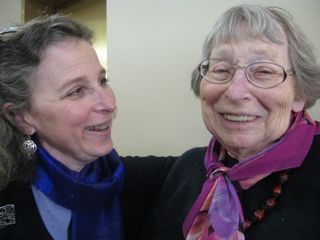
On March 6, 2011, Honey (Anna) Zimmer died. She was 89 years old and one of my earlier mentors. I met Honey when I worked at the Brookdale Center for Healthy Aging of Hunter College in 1987, and we remained friends even after she retired in 2003 and moved to Maine. Honey was a pioneering social worker in the field of aging. She created some of the first support programs in the United States aimed at empowering elders and all those who care for them. Honey helped to create the model for the Brookdale National Group Respite Program that provides appropriate activities for people with dementia while offering respite and other supportive services to their caregivers. The Brookdale Foundation continues to provide seed grants and technical assistance to develop this model across the country; currently there are over 300 programs.
While following Honey’s last weeks via her CarePages and reading people’s comments, I discovered that many of my friends and colleagues also count Honey among their mentors. Reflecting on this, I became aware of two insights: (1) the obligation of mentoring and (2) the “power of one.”
The obligation of mentoring falls on those of us where were fortunate to have received such guidance. Many of us who were mentored by Honey, are in, or have been in, influential positions in geriatric social work. It is our obligation to return the favor to those who are junior in our field. Angela McBride puts it very well in her new book, The Growth and Development of Nurse Leaders. In Chapter 9: Appreciating Others, she writes, “Any investment in people can have a ripple effect because most people who have been helped to achieve their potential understand the obligation to ’pay it forward’ and mentor subsequent generations.” In one of her presentations Angela states, “to those who have received much, much is expected.” Those of us mentored by Honey definitely fall into that group.
Mentoring is also one of the four key elements of a leadership development program, which we described in our 2008 annual report, “A Call for Leadership in Aging.” Mentoring is a form of leadership. But more important, having been mentored by a leader, we are obligated to develop future leaders.
As we see leaders in our field retire or pass away, my colleagues and I often ask ourselves who the next generation of leaders will be. However, looking behind us we don’t see many younger people following in our footsteps. It is time for us to take on leadership roles and to encourage and mentor younger people to enter into and remain in the field of aging.
We also have to remember the “power of one,” the ability of just one person to make a huge difference in the world. There are many examples of the “power of one,” from the profound, such as Gandhi, to the personal, such as Honey was to me and my colleagues. For those of us in geriatrics, it is important to remember that by influencing even just one person we can spark a chain reaction of change.
So in honor of Honey, and in honor of your mentors living or gone, be a mentor, be a leader, be a power of one to at least one person. It is our obligation.
